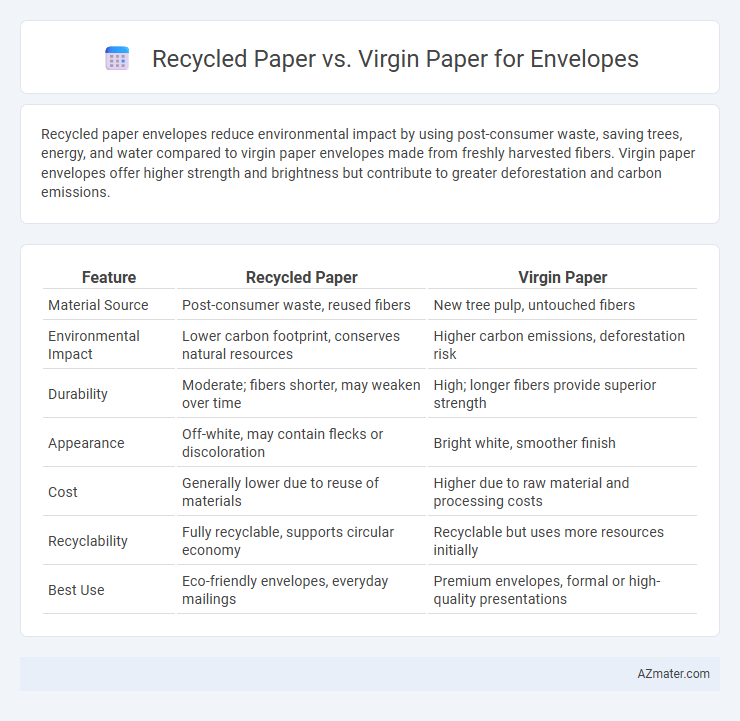Recycled paper envelopes reduce environmental impact by using post-consumer waste, saving trees, energy, and water compared to virgin paper envelopes made from freshly harvested fibers. Virgin paper envelopes offer higher strength and brightness but contribute to greater deforestation and carbon emissions.
Table of Comparison
| Feature | Recycled Paper | Virgin Paper |
|---|---|---|
| Material Source | Post-consumer waste, reused fibers | New tree pulp, untouched fibers |
| Environmental Impact | Lower carbon footprint, conserves natural resources | Higher carbon emissions, deforestation risk |
| Durability | Moderate; fibers shorter, may weaken over time | High; longer fibers provide superior strength |
| Appearance | Off-white, may contain flecks or discoloration | Bright white, smoother finish |
| Cost | Generally lower due to reuse of materials | Higher due to raw material and processing costs |
| Recyclability | Fully recyclable, supports circular economy | Recyclable but uses more resources initially |
| Best Use | Eco-friendly envelopes, everyday mailings | Premium envelopes, formal or high-quality presentations |
Introduction: Recycled vs Virgin Paper for Envelopes
Recycled paper for envelopes is produced from post-consumer waste, reducing environmental impact by saving trees and lowering energy consumption compared to virgin paper. Virgin paper is made directly from wood pulp, offering higher strength and durability but involves deforestation and higher carbon emissions. Choosing recycled paper envelopes supports sustainability goals while maintaining functionality for everyday mailing needs.
Environmental Impact Comparison
Recycled paper envelopes significantly reduce environmental impact by lowering deforestation rates and conserving natural resources compared to virgin paper envelopes, which require fresh pulp from trees. The production of recycled paper uses 60-70% less energy and generates 50-60% fewer greenhouse gas emissions than virgin paper manufacturing. Choosing recycled paper for envelopes supports sustainable forestry practices and reduces landfill waste, contributing to a smaller carbon footprint.
Manufacturing Processes: Recycled vs Virgin Paper
Recycled paper for envelopes involves collecting, sorting, and de-inking used paper to create pulp, reducing the need for virgin fiber and conserving natural resources. In contrast, virgin paper production starts with harvesting trees, mechanical or chemical pulping, and bleaching, which consumes more energy and water while generating higher emissions. The recycled process often requires less energy and fewer chemicals, contributing to a smaller carbon footprint and promoting sustainable envelope manufacturing.
Quality and Durability Differences
Recycled paper envelopes often contain shorter fibers from previously processed materials, resulting in slightly lower strength and durability compared to virgin paper, which is made from fresh wood pulp with longer fibers. Virgin paper envelopes provide superior resistance to tearing, moisture, and wear, making them ideal for important documents or heavy mailing needs. While recycled paper offers eco-friendly benefits, its texture and stiffness may be less consistent, potentially affecting the envelope's overall quality and professional appearance.
Cost and Economic Considerations
Recycled paper envelopes typically cost 10-20% less than virgin paper options due to lower raw material expenses and reduced energy consumption during production. Virgin paper offers higher durability and brightness but involves greater environmental and financial costs linked to deforestation and processing. Choosing recycled paper supports economic sustainability by minimizing waste management expenses and tapping into growing consumer demand for eco-friendly products.
Appearance and Printability
Recycled paper envelopes often have a slightly rougher texture and muted color tones compared to the smooth, bright white appearance of virgin paper, which enhances visual appeal and professional presentation. Virgin paper provides superior printability with sharper image resolution and vibrant color reproduction due to its cleaner fibers and uniform surface. While recycled paper can absorb ink more variably leading to potential print inconsistencies, advancements in recycling technology have improved its performance for standard envelope printing needs.
Availability and Sourcing
Recycled paper envelopes are widely available due to increased demand for sustainable products and sourcing from post-consumer waste streams, making them an eco-friendly choice. Virgin paper envelopes rely on fresh wood pulp sourced from managed forests, which may face supply constraints linked to logging regulations and environmental concerns. Availability of recycled paper envelopes can fluctuate based on the quality and volume of recyclable fiber collected, while virgin paper production depends on continuous access to timber resources and pulp mills.
Certification and Standards
Recycled paper envelopes often carry certifications such as FSC Recycled, Green Seal, and Blue Angel, which ensure environmental responsibility through verified post-consumer fiber content and sustainable production practices. Virgin paper envelopes typically hold FSC or PEFC certifications, indicating they are sourced from sustainably managed forests with strict adherence to ecological and social standards. Both options comply with ISO 14001 environmental management standards, but recycled paper demonstrates a stronger commitment to reducing deforestation and landfill waste.
Consumer Perception and Demand
Consumer perception of recycled paper envelopes increasingly favors environmental sustainability, driving higher demand among eco-conscious buyers seeking green alternatives. Virgin paper envelopes are still preferred for premium quality and durability, yet shifting market trends highlight a growing preference for recycled options due to stronger corporate and personal commitments to reduce carbon footprints. Market data shows a consistent increase in recycled paper envelope sales, reflecting consumer priorities towards eco-friendly packaging solutions and responsible consumption.
Choosing the Right Paper for Envelopes
Choosing between recycled paper and virgin paper for envelopes depends on environmental impact and durability requirements. Recycled paper offers eco-friendly benefits by reducing waste and saving natural resources, making it ideal for businesses aiming to enhance sustainability. Virgin paper typically provides a smoother texture and higher strength, preferred for premium or heavy-duty envelopes where appearance and durability are critical.

Infographic: Recycled paper vs Virgin paper for Envelope
 azmater.com
azmater.com